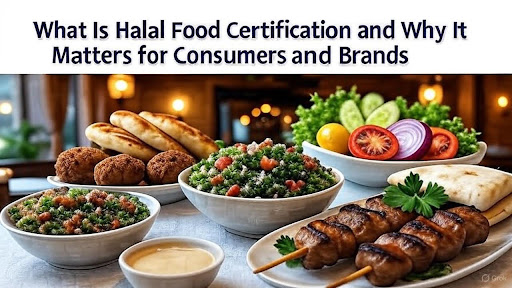Halal food certification is a critical mark of assurance ensuring that food products comply with Islamic dietary laws. Muslims, who adhere to these dietary practices, look for trustable indicators that food meets religious standards, and halal certification provides this transparency. This article explores the importance of halal certification, the requirements behind it, and its relevance in the global food market, especially focusing on the significance of labels like the halal logo food that consumers recognize.
Understanding Halal Food Certification
Halal certification refers to the official documentation and approval that food items meet the Islamic laws of halal, which translates to “permissible.” To earn this certification, food manufacturers, processors, and distributors undergo a thorough evaluation process to confirm all ingredients, handling, and packaging meet specific rules.
For consumers, the halal certified food label simplifies the shopping process by guaranteeing that the product contains no prohibited components such as pork or alcohol and that it is prepared using hygienic methods compliant with religious guidelines.
Essential Halal Food Certification Requirements
The process of halal food certification involves several key steps, all designed to maintain strict adherence to Islamic dietary rules. These halal food certification requirements typically include:
- Using only ingredients sourced from halal animals slaughtered appropriately.
- Ensuring that the production environment is free from contamination by non-halal substances.
- Verifying all food additives and processing aids to ensure compliance.
- Regular audits and inspections by halal certification bodies.
- Proper segregation and cleaning of equipment used in the food processing.
This rigorous procedure not only validates the halal status but also boosts consumer confidence in product integrity.
The Role of the Halal Food Certificate in Food Markets
A halal food certificate is an official document or label issued after fulfilling certification criteria. It enables manufacturers to display their halal compliance prominently on product packaging. For brands targeting markets with Muslim consumers, this certification is essential for building trust and expanding reach.
Having a visible halal certificate supports transparency and helps consumers make informed decisions quickly, identifying safe food choices in busy retail environments.
How Food Standards and Halal Certification Work Together
Food safety and quality are non-negotiable in halal certification. The food standards halal certification combines religious adherence with scientific food safety protocols. This coordination ensures that halal foods are not only permissible but also safe and wholesome.
In many countries, halal certification bodies comply with national and international standards, aligning halal practices with recognized food safety systems such as HACCP, ISO certifications, and FDA regulations.


Food Packaging and Halal Certificate: A Reliable Indicator for Consumers
Packaging plays a significant role in maintaining halal integrity. The food packaging halal certificate must be clearly visible and accurately reflect the certified status to prevent confusion or mislabeling.
Correct packaging avoids cross-contamination and ensures that halal products maintain their quality throughout distribution and retail, preserving consumer confidence until the point of purchase.
Halal Food Certification in the USA
In the halal food certification USA environment, multiple certification agencies operate to serve the diverse Muslim population. The USA market demands transparency and adherence to strict compliance guidelines, ensuring halal products meet localized food safety standards alongside religious criteria.
Consumers can rely on widely accepted halal certification marks recognized by leading organizations, which back the authenticity of halal foods distributed nationally.
The Impact of Halal Certification on the Food Industry
Halal certification influences both consumer habits and industry standards globally. It encourages food manufacturers, suppliers, and retailers to adopt stringent measures in their supply chain and production processes. Brands certified as halal often gain access to broader markets, including Muslim-majority countries and niche consumer segments focused on ethical and religious dietary practices.
Halal Watch World’s Contribution to Halal Food Certification Transparency
One of the key players in facilitating accurate halal food certification is Halal Watch World. They provide technology-driven solutions for halal assurance, helping brands verify authenticity and communicate halal compliance efficiently to consumers worldwide.
Their platforms enable easier recognition of certified foods through digital tools that complement existing physical certifications, driving trust and boosting halal market visibility.

